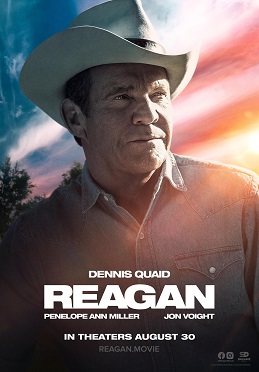
REAGAN ENDED COLD WAR
Posted August 31st, 2024 at 6:02 pmNo Comments Yet
IN REVIEW

DIRECTOR BREAKS THE POLITICAL TIME OF A PRESIDENT INTO PIECES
By PETER THOMAS BUSCH
The favorite president was not so famously regarded as a Hollywood actor.
Dennis Quaid portrays Former United States President Ronald Reagan as an honest and sincere person who begrudgingly finds his life course transitioning him away from the picture shows and into politics, in Reagan (2024).
The character is put together with all those facial gestures and physical mannerisms as seen on television over and over again, as Reagan liked to talk and spent many hours with the public giving news conferences and delivering speeches.
Quaid does not quite master the Reagan voice although he almost gets the character’s speech there. As a result, the actor does not quite disappear from the character.
Mena Suvari appears in the early part of the film as Reagan’s first wife, Jane Wyman, during the twilight years of his film career, while Penelope Miller is at times a dead ringer for Nancy, the First Lady of the State of California and, ultimately, the First Lady of the United States of America.
Director Sean McNamara cast an interesting collection of faces to fill in the background, such as Jon Voight as Victor Petrovich, a Russian intelligence agent who had followed Reagan from his early days as an actor in Hollywood and then even more so as he entered politics as the Vice President of the Screen Actors Guild.
Voight provides a voice over to help with scene transitions and time jumping. The narrative technique of using an interview to tell the story adds an extra depth to the script.
McNamara goes beyond using the interview as a wraparound by continually going back to the post mortem discussion in the room about Reagan where the interview is occurring in movie realtime.
Everything else is in the past, with Reagan himself occasionally taking everyone back into his childhood through a psychotropic flashback, as a kind of play within a play.
Kevin Dillion has a brief but convincing role as Jack Warner of Warner Bros Studios during the unionization of the film industry when Reagan was transitioning from film art to union politics.
McNamara adopts a bit of the Reagan wit by casting Pat Boon as Reverend George Otis and then also a younger actor as Pat Boon in the same scene together meeting with Ron and Nancy Reagan. The meeting is later referred to by the Reagan’s as weird.
The director also joins Quaid in recreating that Reagan personality by rapidly advances through a series of scenes of successive Soviet presidents dying in office.
A lot of actors are required to play the well known public figures that enter and leave Reagan’s political life over the years, because the film is a life/career retrospective. But the casting stops short of what might be considered an ensemble cast of well known actors.
McNamara gets through some five decades of biographic material by jumping from one policy milestone to the next, including those defining points of interest during childhood that can shape a young personality.
The score helps bind these issue milestones together. Composer John Coda maintains the tone and atmosphere of the film, especially when there is this sense, after about 90 minutes, that the narrative will just not stop accelerating.
A director might time jump to get everyone to the place where the story finally begins, but McNamara just keeps on jumping right up to the time that Reagan rides his horse on his California ranch for one last time before the closing credits.
Time also advances with the use of multi-media, such as the recreation of photographs on the front pages of newspapers, and the photoshopping of the actors’ faces on newsreel footage. When the plot is ready for the reversal, a montage of newsreels encapsulates the street politics that occurred during the 8 years of the Reagan Presidency.
Quaid and Voight benefit from digital anti-aging cream.
The narrative is glued together by some recurring images and themes. Reagan had a charming and unique way of delivering the political message, with certain facial mannerism and eye gestures. Ron and Nancy had this well known doting love for each other. And Reagan had this “thrusting wit” that could make the entire room of people suddenly burst into laughter, even during the most serious of moments.
McNamara conveys though that Reagan’s most enduring legacy was presiding over the collapse of the Soviet Union and bringing an end to the Cold War.
The script tells the story of how the anti-communist ideology developed inside the mind of the politician and of how he became relentless in his desire to bring about the victory of freedom over tyranny. Reagan was hardly deterred by his unsuccessful bid to win the Republican Party nomination for President from the presumptive Republican nominee, incumbent President Gerald Ford in 1976.
A bit of a developing auteur has provided an interesting pressing of the Reagan story, although not everything works or what works, at times, may be used a bit too often, over and over again.